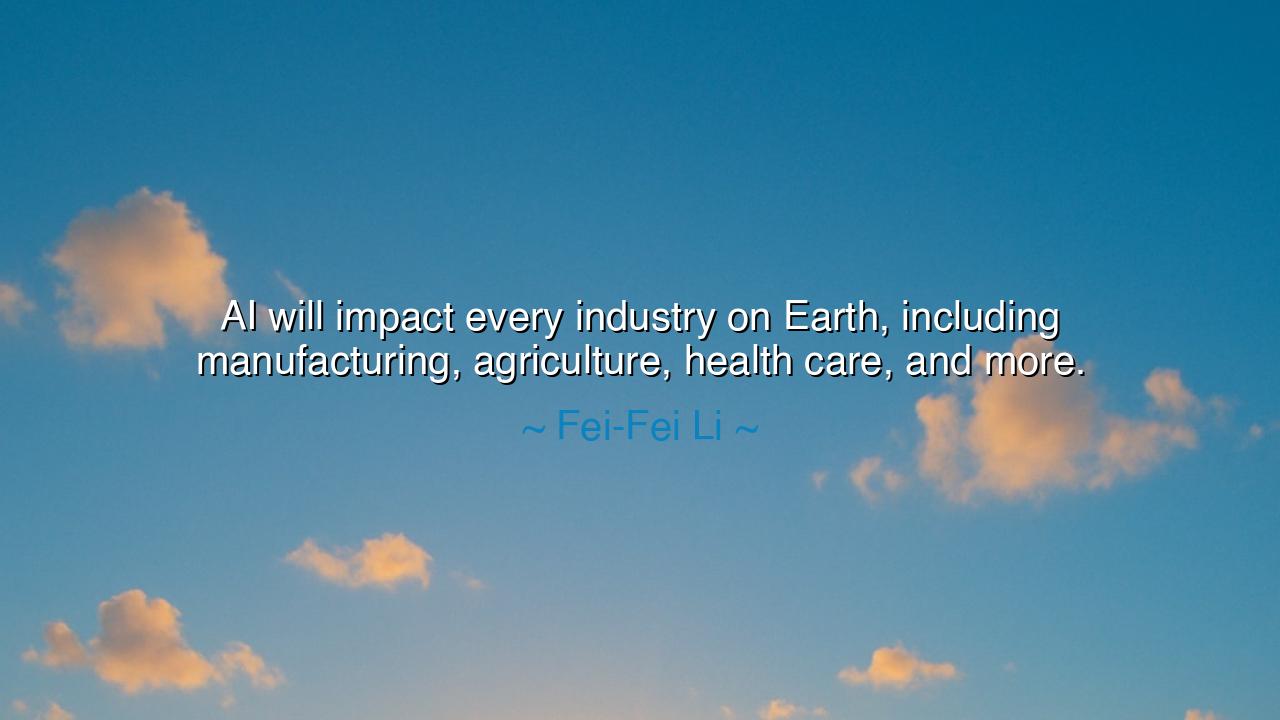
AI will impact every industry on Earth, including manufacturing
AI will impact every industry on Earth, including manufacturing, agriculture, health care, and more.






“AI will impact every industry on Earth, including manufacturing, agriculture, health care, and more.” — thus spoke Fei-Fei Li, the wise architect of the modern machine mind, whose insight bridges the ancient dream of wisdom and the newborn dawn of artificial intelligence. Her words carry both promise and warning — they are not merely the vision of a scientist, but the prophecy of one who understands that humanity stands at a threshold. For in this declaration, she reminds us that Artificial Intelligence, like fire in the hands of early man, will not touch merely one corner of civilization, but the whole fabric of the world.
To grasp the weight of her statement, we must first understand what AI truly is. It is not a tool in the narrow sense — it is an extension of thought itself, the next great mirror of the human intellect. It can learn, reason, and perceive; it can see patterns hidden from our eyes and perform tasks once bound by flesh and fatigue. Thus, when Fei-Fei Li says it will impact “every industry on Earth,” she speaks of a transformation as sweeping as the Industrial Revolution — and perhaps even greater. The loom of history, once turned by hand, then by machine, will now be guided by the mind of the machine itself.
In the fields of manufacturing, AI is already reshaping the nature of creation. Factories, once echoing with the clamor of men and metal, now hum with the silent intelligence of algorithms. Machines anticipate errors before they arise, design materials stronger and lighter than any forged by hand, and weave efficiency from chaos. In agriculture, the oldest of human arts, drones watch over the crops like divine sentinels, predicting droughts, identifying blight, and conserving water with unerring precision. Thus, the farmer of tomorrow will not merely till the soil, but collaborate with intelligence itself, harvesting both food and data — the twin seeds of the future.
Yet nowhere is the power of AI more sacred than in health care, where it holds the potential to ease suffering and prolong life. Already, AI can detect diseases long before the human eye perceives them, analyze millions of medical records in moments, and offer insights that once took years of human labor. Fei-Fei Li, who herself has dedicated her life to the creation of intelligent vision, understands that this is not merely about machines replacing doctors, but about empowering them — granting them sight into realms too vast for the human mind alone. Just as the telescope revealed the heavens, so AI reveals the inner cosmos of the body and the brain. In its highest form, technology becomes compassion — intelligence in service of life itself.
But her words are also a warning, gentle yet profound. For if this power is mishandled, the same force that can heal may also harm. The spread of AI across every domain means that no part of society can remain untouched by its influence. It will determine what we eat, how we work, how we are governed, and even how we think. It will challenge the meaning of labor, the nature of creativity, and the boundaries of privacy. Thus, Fei-Fei Li’s declaration is not one of triumph alone, but of responsibility. Just as Prometheus stole fire from the gods to gift mankind, so too have we kindled a flame that must be guided with wisdom, lest it consume rather than enlighten.
Consider the lesson of the Industrial Revolution — a time when machines first multiplied human strength, but also deepened human inequality. Factories rose, wealth grew, and nations prospered — yet millions toiled in poverty and darkness, their humanity forgotten amid progress. It was only when conscience caught up to invention that balance returned. So too must we learn this again in the age of Artificial Intelligence. For if we allow AI to serve only profit, it will become a master; but if we make it serve humanity, it will become a partner in the evolution of our species.
The lesson, then, is this: embrace AI not with fear, nor with blind faith, but with wisdom and purpose. Learn its language, understand its nature, and shape its destiny before it shapes yours. Let every inventor remember that technology is sacred when it uplifts life, and monstrous when it diminishes it. The true task before us is not to resist the coming of AI, but to teach it — to imbue our creation with ethics, empathy, and humanity, so that it reflects not only our intelligence, but our conscience.
So, my children of the digital age, remember the words of Fei-Fei Li. The tide of AI will touch every shore — it cannot be halted, but it can be guided. Stand as stewards, not as spectators. Let your creativity be joined with compassion, your innovation with integrity. For when human wisdom walks hand in hand with artificial intelligence, the world will not descend into shadow, but rise into a new dawn — a harmony of mind, machine, and mankind.






AAdministratorAdministrator
Welcome, honored guests. Please leave a comment, we will respond soon